Bulletin N° 864
The War Game
https://www.bing.com/videos/search?q=the+bomb+teh+war+game+peter+watkins&&view=detail&mid=C3CC804732D9F2C5D4EDC3CC804732D9F2C5D4ED&&FORM=VRDGAR
(46min)
A blend of television drama and documentary, that depicts a nuclear war. Written, directed and produced by Peter Watkins for the BBC, it caused dismay within the BBC and also within government, and was subsequently withdrawn before the provisional screening date of 7 October 1965. The corporation said that "the effect of the film has been judged by the BBC to be too horrifying for the medium of broadcasting. It will, however, be shown to invited audiences..." This film eventually premiered at the National Film Theatre in London, on 13 April 1966, where it ran until May 3. It was then shown abroad at several film festivals, including the Venice one where it won the Special Prize. It also won the Academy Award for Best Documentary Feature in 1967. Eeventually it was televised in Great Britain on 31 July 1985, during the week before the fortieth anniversary of the Hiroshima bombing. . . .
Subject
:
The
Capitalist Conspiracy, Part 2: In search of a theoretical framework for an
intuitive grasp of the subject.
October 26, 2019
Grenoble,
France
Dear
Colleagues and Friends of CEIMSA,
We
depart momentarily from our discussion of Docherty and Macgregor’s 2013 study
of The
Secret Origins of the First World War to look at an orthodox
Marxist view presented some years before by Eric Hobsbawm.
In
his introduction to the fourth volume of his quadrilogy
on modern world history, Age of
Extremes, The Short Twentieth Century
(1994), Eric Hobsbawm (1917-2012) wrote about the
task of a professional historian:
The destruction of the past, or rather of
the social mechanisms that link one’s contemporary experience to that of
earlier generations, is one of the most characteristic and eerie phenomena of
the late twentieth century. Most young men and women at the century’s end grow
up in a sort of permanent present lacking any organic relation to the public
past of the times they live in. . . .
However, it is not the purpose of this
book to tell the story of the period which is its subject, the Short Twentieth
Century from 1914 to 1991, although no one who has been asked by an
intelligent American student whether the phrase ‘Second World War’ meant that
there had been a ‘First World War’ is unaware that knowledge of even the basic
facts of the century cannot be taken for granted. My object is to understand
and explain why things turned out the way they did, and how they hang
together. . . . Readers who belong to another era, for instance the student
entering university at the time this is written, for whom even the Vietnam War
is prehistory, should not forget this.(pp.3-4)
In
his book, The Age
of Empire, 1875-1914 (1987), on the origins of the First World
War, Hobsbawm has very little to say about the role
of finance capital. He tells the reader that before the turn of the 19th
century most economic activities were shaped by nationalism. However there were exceptions to this pattern.
It
is certainly true that there were and are economic
activities such as international finance which are “essentially cosmopolitan
and thus escaped from national constraints, insofar as these were effective.
Yet even such transnational enterprises took care to attach themselves to a
suitably important national economy. The (largely German) merchant banking
families thus tended to transfer their headquarters from Paris to London after
1860. And the most international of all great banking houses, the Rothschilds, flourished where they operated in the capital
of a major state, and wilted where they did not: The Rothschilds
of London, Paris and Vienna remained major forces, but the Rothschilds
of Naples and Frankfurt (the firm refused to transfer to Berlin) did not. After
the unification of Germany, Frankfurt was no longer enough.
. . .
But the developed world was not only a aggregate of ‘national economies’. Industrialization and
the Depression turned them into a group of rival economies, in which the
gains of one seemed to threaten the position of others Not
only firms but nations competed. Henceforth the flesh of British readers was
made to creep by journalistic exposés of German economic invasion. . . . Their
fathers had remained calm in the fact of (justified) warnings of the technical
superiority of foreigners. Protectionism expressed a situation of international
economic competition.(p.42)
At
the same time, unprecedented economic concentration produced by mergers and
market-controlling agreements between firms, which according to free-enterprise
theory, should have been engaging in cut-throat competition to the benefit of
consumers, gave birth to a handful of dominating firms, the oligopolies.
Such
were the American ‘trusts’, which provoked anti-monopolist legislation like the
Sherman Anti-Trust Act (1890) of uncertain efficacy, the German ‘syndicates’ or
‘cartels’ – mainly in the heavy industries – which enjoyed government favour. The Rhine-Westphalian
Coal Syndicate (1893), which controlled something like 90 percent of the coal
output in its region, or the Standard Oil Company, which in 1880 controlled
90-95 per cent of the oil refined in the USA, were
certainly monopolies. So, for practical purposes, was the ‘billion-dollar
Trust’ of United States Steel (1901) with 63 per cent of American output. It is
also clear that a trend away from unrestricted competition and towards ‘the
combination of several capitalists who formerly operated singly’ became
strikingly obvious during the Great Depression, and continued in the new period
of global prosperity. A tendency towards monopoly or oligopoly is undeniable in
the heavy industries, in industries closely dependent on government orders such
as the rapidly growing armaments sector . . . , in industries generating and
distributing revolutionary new forms of energy, such as oil and electricity, in
transport, and in some mass consumer goods such as soap and tobacco.
However, market control and the elimination
of competition were only one aspect of a more general process of capitalist
concentration. . . . In banking, a handful of giant joint-stock banks with
national networks of
branches replaced the smaller banks at great speed. Lloyds Bank swallowed 164
of them. After 1900, as has been noted, the old-fashioned –or any – British
‘country bank’ had become ‘a historical curiosity’.(pp.43-44)
Hobsbawm
sees the origins of the First World War as related to the systemic
contradictions of the capitalist system, and not to the moral failures of
specific individuals or groups of individuals.
The
symbiosis of war and war production inevitably transformed the relations
between government and industry, for, as Frederick Engels observed in 1892, ‘as
warfare became a branch of the grande industrie . . . la grande industrie . . . became a political necessity’. And
conversely, the state became essential to certain branches of industry, for who but the government provided the customers for armaments.
The goods it produced were determined not by the market, but by the
never-ending competition of governments to secure for themselves a satisfactory
supply of the most advanced, and hence the most effective arms. What is more,
governments needed not so much the actual output of weapons, but the capacity
to produce them on a wartime scale, if the occasion arose; that is to say they
had to see that their industry maintained a capacity far in excess of any
peacetime requirements.
In one way or another
states were thus obliged to guarantee the existence of powerful national
armaments industries, to carry much of their technical development costs, and
to see that they remained profitable. In other words, they had to shelter these
industries from the gales which threatened the ships of capitalist enterprise
sailing the unpredictable seas of the free market and free competition. They
might of course have engaged in armaments manufacture themselves, and indeed
they had long done so. But this was the very moment when they – or at least the
liberal British state – preferred to come to an arrangement with private
enterprise. In the 1880s private armament producers took on more than a third
of supply contracts for the armed forces, in the 1890s 46 per cent, in the
1900s 60 per cent: the government, incidentally, was ready to guarantee them
two-thirds. It is hardly surprising that armaments firms were among, or joined,
the giants of industry: war and capitalist concentration went together. In
Germany Krupp, the king of cannons, employed 16,000 in
1873, 24,000 around 1890, 45,000 around 1900, and almost 70,000 in 1912 when
the fifty-thousandth of Krupp’s famous guns left the works. In Britain
Armstrong, Whitworth employed 12,000 men at their main works in Newcastle,
who had increased to 20,000 – or over 40 per cent of all metalworkers on Tyneside – by 1914, not counting those in the 1500 smaller
firms who lived by Armstoong’s sub-contracts. They
were also very profitable.
Like the modern ‘military-industrial
complex’ of the USA, these giant industrial concentrations would have been
nothing without the armaments race of governments. It is therefore tempting to
make such ‘merchants of death’ . . . responsible for the ‘war of steel and
gold”. . . .(p.307-308)
According
to Hobsbawm, the problem of discovering the origins
of the First World War is not one of identifying the aggressor. “It lies in the
nature of a progressively deteriorating international situation which
increasingly escaped from the control of governments.” The creation of the
unified German Empire in 1871, he writes,
made
international relations more tense, it did not make a general European war
inevitable, if only because the issues which divided France and Germany (namely
Alsace-Lorraine) were of no interest to Austria, and those which risked
conflict between Austria and Russia (namely the degree of Russian influence in
the Balkans) were insignificant for Germany. The Balkans, Bismarck had
observed, were not worth the bones of a single Pomeranian grenadier. France had no real quarrels with Austria, nor Russia with Germany.
For that matter the issues which divided France and Germany, though permanent,
were hardly considered worth a war by most French, and those dividing Austria
and Russia, though – as 1914 showed – potentially more serious, only arose
intermittently. Three developments turned the alliance system into a time-bomb:
a situation of international flux, destabilized by new problems for and
ambitions within the powers; the logic
of joint military planning which froze confronting blocs into permanence; and
the integration of the fifth great power, Britain, into one of the blocs. .
. .
Between
1903 and 1907, to everyone’s surprise including her own, Britain joined the
anti-German camp. The origin of the First World War can best be understood by
tracing the emergence of the Anglo-German antagonism.(p.312-314)
We
share with this historian the belief that an understanding of the origins of
the First World War will contribute to our understanding of the dire situation
we find ourselves in today, which has been produced once again by the private profit motive of capitalism-in-crisis.
The
19 + items below present
a collage of current events that depict the present stage of the capitalit crisis. We
believe, as always, that a theoretical understanding of the system of which we are a part
is essential for self-understanding, the first step towards taking control
over our own lives.
Francis Feeley
---
Professeur
honoraire de l'Université
Grenoble-Alpes
Ancien Directeur des
Researches
Université de Paris-Nanterre
Director of The Center for the Advanced Study
of American Institutions and Social Movements
(CEIMSA-in-Exile)
The University of California-San Diego
http://www.ceimsa.org
a.
The Road to
Damascus: How the Syria War was Won
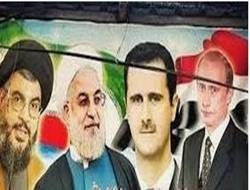
http://www.informationclearinghouse.info/52416.htm
by Pepe Escobar
What is happening in Syria, following yet another Russia-brokered
deal, is a massive geopolitical game-changer. I’ve tried to summarize it in a
single paragraph this way:
“It’s a quadruple win. The U.S. performs a face saving withdrawal,
which Trump can sell as avoiding a conflict with NATO ally Turkey. Turkey has
the guarantee – by the Russians – that the Syrian Army will be in control of
the Turkish-Syrian border. Russia prevents a war escalation and keeps the
Russia-Iran-Turkey peace process alive. And Syria will eventually regain
control of the entire northeast.”
Syria may be the biggest defeat for the CIA since Vietnam.
Yet that hardly begins to tell the whole story.
Allow me to briefly sketch in broad historical strokes how we got
here
It began with an intuition I felt last month at the tri-border
point of Lebanon, Syria and Occupied Palestine; followed by a subsequent series
of conversations in Beirut with first-class Lebanese, Syrian, Iranian, Russian,
French and Italian analysts; all resting on my travels in Syria since the
1990s; with a mix of selected bibliography in French available at Antoine’s in
Beirut thrown in.
The Vilayets.
Let’s start in the 19thcentury when Syria consisted of
six vilayets — Ottoman provinces — without counting Mount Lebanon, which
had a special status since 1861 to the benefit of Maronite
Christians and Jerusalem, which was a sanjak (administrative
division) of Istanbul.
The vilayets did not define the
extremely complex Syrian identity: for instance, Armenians were the majority in
the vilayet of Maras, Kurds in Diyarbakir – both now part of Turkey in
southern Anatolia – and the vilayets of Aleppo and Damascus
were both Sunni Arab.
Nineteenth century Ottoman Syria was the epitome of
cosmopolitanism. There were no interior borders or walls. Everything was
inter-dependent.
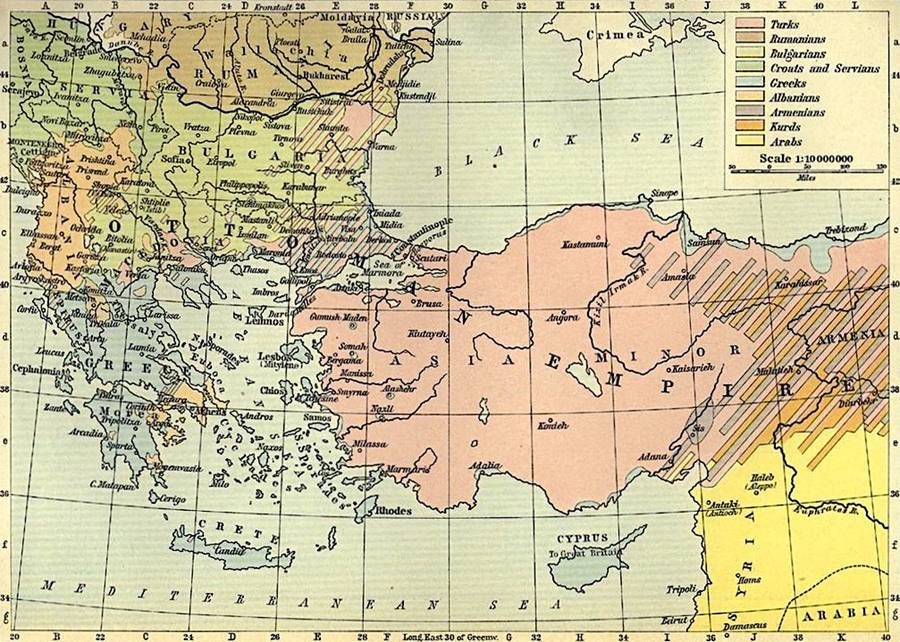
Then the Europeans, profiting from World War I, intervened. France got the Syrian-Lebanese littoral, and later the vilayets of Maras and Mosul (today in Iraq). Palestine was
separated from Cham (the “Levant”), to be internationalized. The vilayet of Damascus was cut in half: France got the north, the Brits got
the south. Separation between Syria and the mostly Christian Lebanese lands
came later.
There was always the complex question of the Syria-Iraq border.
Since antiquity, the Euphrates acted as a barrier, for instance between the
Cham of the Umayyads and their fierce competitors on
the other side of the river, the Mesopotamian Abbasids.
James Barr, in his splendid “A Line in the Sand,” notes,
correctly, that the Sykes-Picot agreement imposed on the Middle East the
European conception of territory: their “line in the sand” codified a delimited
separation between nation-states. The problem is,
there were no nation-states in region in the early 20thcentury.
The birth of Syria as we know it was a work in progress, involving
the Europeans, the Hashemite dynasty, nationalist Syrians invested in building
a Greater Syria including Lebanon, and the Maronites
of Mount Lebanon. An important factor is that few in the region lamented losing
dependence on Hashemite Medina, and except the Turks, the loss of the vilayet of Mosul in what became Iraq after World War I.
In 1925, Sunnis became the de facto prominent power in Syria, as
the French unified Aleppo and Damascus. During the 1920s France also established
the borders of eastern Syria. And the Treaty of
Lausanne, in 1923, forced the Turks to give up all Ottoman holdings but
didn’t keep them out of the game.
===========
b.
Kings Bay Plowshares 7: Trial Begins for Liz McAlister
& Others for Breaking Into Nuke Sub Base
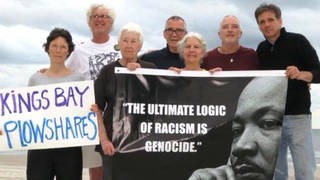
https://www.democracynow.org/2019/10/21/kingsbay_plowshares_seven_activists_trial
with Liz McAlister
+
From: Diana Johnstone [mailto:diana.johnstone@wanadoo.fr]
Sent: Sunday, October 20, 2019 10:22 PM
Subject: US-backed
"Color Revolutions" activist elected Scottish University Rector
For
anyone who knows the history of CANVAS’ executive director, Srdja
Popovic, this is beyond belief!
 https://canvasopedia.org/?s=srdja+popovic
https://canvasopedia.org/?s=srdja+popovic
Srdja Popovic
Installed as St Andrews’ 53rd Rector
On Friday, April 13, Srdja Popovic officially became
the 53rd Rector of the Scotland’s first university. (via
St Andrews) Since 1858, the Rector has been elected by the students. Srdja follows in the footsteps of a long list of
illustrious former Rectors, including authors J M Barrie and Rudyard Kipling,
Monty Python founding member John Cleese and
Catherine Stihler MEP. In addition to being President
of the University Court, the highest governing body of the University, the
Rector also plays an informal, pastoral role for students. The official
installation ceremony followed the traditional student ‘drag’ (Wednesday
11 April), which saw students lead the new Rector on an epic six-hour tour of
student halls and local hostelries in a day of celebration, which included a
procession through the town. “I am proud and honoured
to serve as a Rector – a voice and empowerment of students of St Andrews. I am
ready to commit my term to listening to the students and turning their
initiatives into concrete action. The position of the Rector belongs to the
students, and it will be my goal to empower students to use it in their best
interest!” Lewis Wood, President of the St Andrews Students’ Association said:
“The Rector’s Installation is a day of celebration to welcome Srdja to the University community. Srdja’s
campaign and vision for St Andrews inspired a lot of students last October and
we look forward to inducting him into our traditions and culture. Both myself and the student body wish him all the best for the
three years ahead, and look forward to working closely with...
Srdja Popovic
for The Economist – How to Bring Down a Dictator in 5
Simple Steps
Over half of the world still lives
under an authoritarian regime, ruled by all different types of dictators. But
people are not powerless to overcome their suffering under these regimes. On
Kim Jong Un’s very own birthday, The
Economist published this ultra-short lecture: How to fight for freedom and
democracy in 5 simple steps, by CANVAS’ very own Srdja...
REAL CLEAR POLITICS
How Poland Can
Be an Example Again, by Srdja Popovic
and Greg Satell
Despite the fact that activists in
Poland have already made some important strides, their efforts still fall short
of creating sustainable change. For RealClearWorld,
CANVAS’ executive director Srdja Popovic writes about the worrying direction of the
Polish democratic movement. After two waves of democratic movement in the last
four decades, we are now seeing that same democratic process moves in
reverse. Poland sits at the epicenter of that worrying dynamic. “The
painstaking work undertaken over the past quarter century to create a civil
society with solid democratic institutions is now under siege from a populist
movement that operates under the thin guise of what it calls traditional
values.” In stopping their country to move towards authoritarianism, and
protecting civil society, activists in Poland have already fought some
important battles. Almost as soon as PiS assumed
power, activists have been able to mobilize
civil society outside the sphere of party politics. They have extended the
battlefield by strongly emphasizing the involvement of the international
community, and effectively combined mass mobilization for street protests with
concrete actions. Despite the progress that has been made, crucial
elements for creating sustainable change are still missing. While the
individual activist groups have been effective in their own way, there has been
little effort to create a strong unity within collective action.
Then, while the opposition forces in Poland have
mostly beendefending democratic institutions
by reacting to government actions, they must go on offense to create
sustainable change. Finally, while uniting and taking the
offense, activists have to develop an affirmative vision for the
future. In a society where PiS’s message of
traditional values clearly has resonance, what
positive alternatives can the opposition movement offer? This years’ developments in Poland cause both worries and
hope. Can Poland become...
CANVAS founder Srdja Popovic elected new Rector
of St. Andrews University
After being approached by a St.
Andrews student, CANVAS founding member Srdja Popovic ran for the position of Rector at St. Andrews
University – and won the election last week. Running against MSP and Scottish
Liberal Democrat leader Willie Rennie, Popovic was able to secure double the student’s votes. The
position of Rector, existing at Scotland’s oldest universities, is elected by
the student body every three years to become President of the University Court,
presiding over meetings taking essential decisions for the University. In the
new position of Rector at the prestigious university, Srdja
Popovic “aims to empower students in St Andrews to mobilise themselves”, he told Rachel Miller from BBC News.
The Serbian activist further stated that one of the goals should be to build a
student movement as a platform for broader social change. Srdja
Popovic already came closer to achieving this goal by
helping 50 students active in the campaign to build their own ‘students for
students’ movement. He also revealed to BBC that what ultimately convinced him
to run for the position, was the discovery that one of
the former Rectors was John Cleese who inspired him
in his own creative protest through Monty Python’s absurd humor. To read more
about Srdja Popovic and his
new position as the Rector of the University of St. Andrews, read this BBC
article. For those who speak Serbian, take a look at this N1 Info article.
Photo: N1...
How to Topple a Dictator
TEDxKrakow Talk by Srdja Popovic
Srdja spoke at TEDxKraków, an
independently organised TED event which took place on
20 October 2011 at the Manggha Centre for Japanese
Art and Technology in Kraków, Poland. Srdja talked about people power movements and bringing down
dictators through non-violent struggle....
===========
c.
“Is
it food?” - NYU’s Marion Nestle
with Chris Hedges
+
ExxonMobil Is Still Bankrolling Climate Science
Deniers
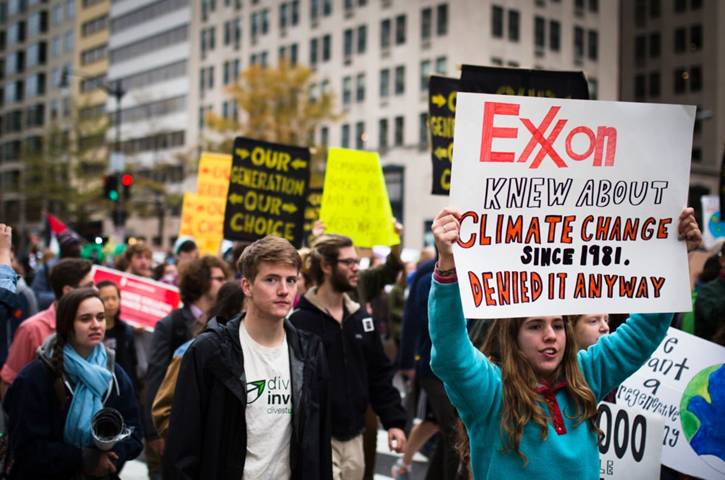
https://truthout.org/articles/exxonmobil-is-still-bankrolling-climate-science-deniers/
by Elliott Negin
===========
d.
Freedom
Rider: Trump, Obama and Syria
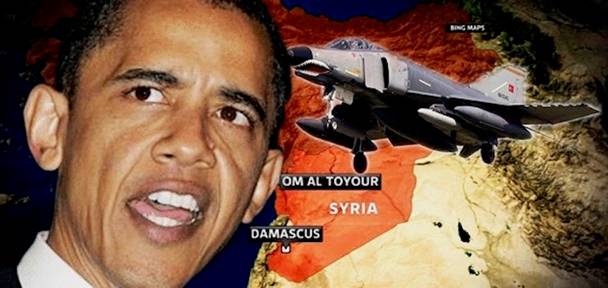
https://blackagendareport.com/freedom-rider-trump-obama-and-syria
by Margaret Kimberley
===========
e.
Women Are Missing at Central Banks
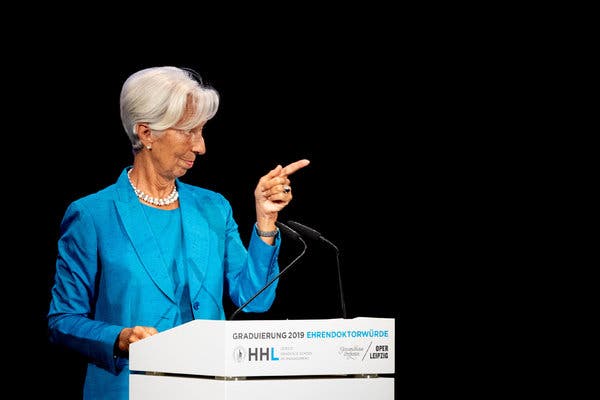
===========
f.
Haiti
and the Convenience of Imperial Amnesia
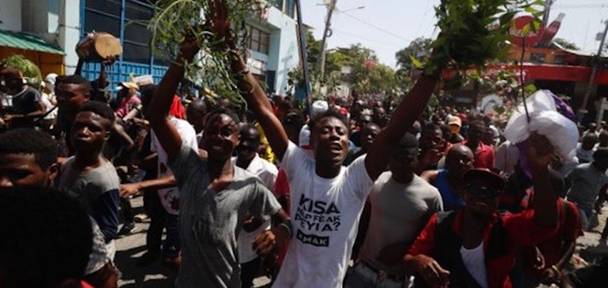
https://blackagendareport.com/haiti-and-convenience-imperial-amnesia
by Jemima Pierre
+
“We Want Democracy to Be Restored”: Protesters in
Chile Decry Inequality Amid Military Crackdown
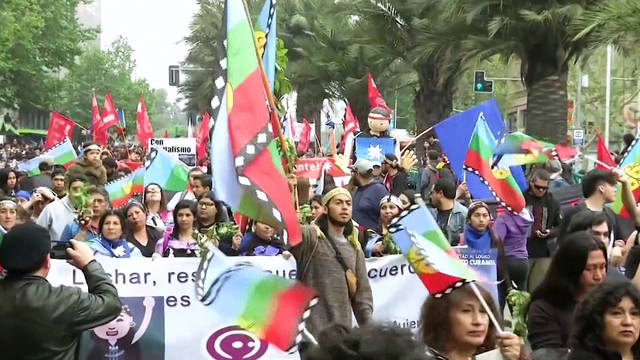
https://www.democracynow.org/2019/10/21/chile_metro_fare_hike_nationwide_protests
with Andra
Chastain and Francisca
Perales
===========
g.
‘A 1950s show trial’: John Pilger
describes ‘disgraceful’ courtroom treatment of Julian Assange
by UK judge
https://www.rt.com/uk/471652-john-pilger-assange-court/
+
That
we live under a dictatorship is now unquestionable: The
Assange Case
https://theduran.com/that-we-live-under-a-dictatorship-is-now-unquestionable-the-assange-case/
+
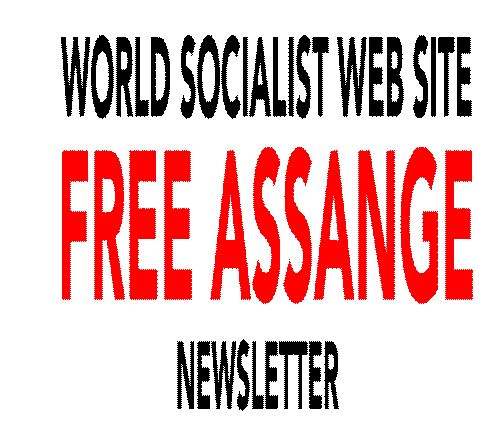
+
From: Diana Johnstone
Sent: Tuesday, October 22, 2019
Subject: IMPORTANT: Only Cowards And Sadists
Support The Persecution Of Assange
Only Cowards And
Sadists Support The Persecution Of Assange
https://caitlinjohnstone.com/2019/10/22/only-cowards-and-sadists-support-the-persecution-of-assange/
===========
h.
Laura
Flanders Show: How to Make a Democratic Economy
https://therealnews.com/third_party_content/laura-flanders-show-how-to-make-a-democratic-economy
===========
i.
Myopic
Morality: The Rehabilitation of George W. Bush
https://www.counterpunch.org/2019/10/21/myopic-morality-the-rehabilitation-of-george-w-bush/
===========
j.
Gilets jaunes Acte 49 honours France’s
firefighters
===========
k.
RT
NEWSLETTER (October 20, 2019)

https://subscribe.rt.com/preview/buR3te
+
Noam
Chomsky signs call to boycott Turkey
and prevent the ethnic cleansing of
Kurdish people
===========
l.
Black
Activists Targeted -- by FBI and Killers Unknown
https://blackagendareport.com/black-activists-targeted-fbi-and-killers-unknown-glen-ford-real-news-1
with Glen Ford
TRNN
correspondent Jacqueline Luqman and Black Agenda
Report executive editor Glen Ford discuss the murders of Botham
Jean and Joshua Brown in Dallas, Texas, the deaths of Black activists in
Ferguson, Missouri, and the FBI’s long campaign to target Black activists for
judicial and extrajudicial harm.
+
Botham Jean and America’s Apartheid
Police State
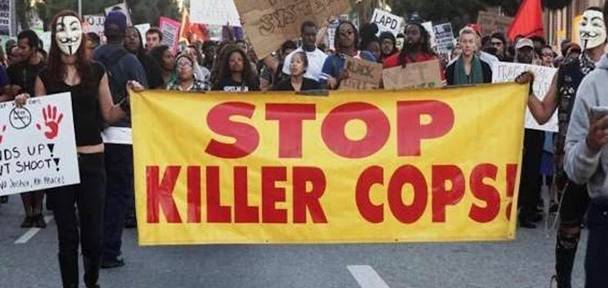
https://blackagendareport.com/botham-jean-and-americas-apartheid-police-state
by Danny Haiphong
The
death of Black males under American apartheid is not only absolved by white
society but also treated as necessary for the upkeep of the status quo.
“The shock troops for the American
apartheid regime can depend on the Black misleadership
class for protection and safety.”
The
word apartheid has generally been used to describe South Africa up until 1994
and most recently Israel’s present colonial arrangement. However, South Africa
and Israel received direct support and encouragement from history’s most
effective form of apartheid, the United States. The United States, also known
as “America,” is an apartheid state—one based on the mass kidnapping African
people and the establishment of a white settler regime designed to protect the
profits derived from slavery and land theft. Botham
Jean is but another victim of the American apartheid police-state. Off duty cop Amber Guyger received ten years in prison for her act of
lynching. Whatever real or imagined justice derived from Guyger’s
slap on the wrist prison sentence was discredited by the spectacle of
forgiveness present at her trial. Brandt Jean’s forgiving testimony and embrace
with Guyger gave the corporate media the opportunity
to restore white innocence, which is a core assumption of American apartheid’s
project of mass Black elimination.
Not
a week passed after Guyger was simultaneously
convicted and forgiven that Joshua Brown, Jean’s neighbor, was brutally killed.
Brown was set to testify in a lawsuit
against the Dallas police and had provided the most
important testimony at Jean’s trial. For challenging Guyger’s
proclamation of victimhood, Joshua Brown was murdered. The swiftness of Brown’s
murder and the botched criminalization of his reputation following the capture
of his alleged assailant indicates that Guyger and the Dallas police department have facilitated
another lynching, this time in retribution for testifying against a police
officer. As Tommy Curry makes clear in his book, The Man-Not, the death of Black males under American
apartheid is not only absolved by white society but also treated as necessary
for the upkeep of the status quo. Black Americans such as Brown who challenge
the normalcy of state-sanctioned violence are discredited, defamed, and
assassinated.
“Off duty cop Amber Guyger received ten years
in prison for her act of lynching.”
In
the Black Lives Matter era, America’s apartheid police state has been subject
to an increased level of popular scrutiny. Police impunity in the killing of
Black Americans has been thoroughly exposed by the Black activist movement and
its allies. Still, it remains rare
for cops to receive an indictment let alone a conviction for
murdering Black Americans. Most killer cops, like Stephon
Clark’s murderers in blue, end up
back in uniform .
Amber Guyger assassinated Botham
Jean in his own home, so the American apartheid state felt compelled to give
the known racist a slap on the wrist for first degree murder. However, the
armed troops of American apartheid were far from satisfied with Brandt Jean’s
gesture of forgiveness and decided to make Joshua Brown yet another victim of
racist state terror after his emotional testimony exposed Guyger’s
crimes against humanity.
===========
m.
Jesse
Ventura talks about CIA implanted in State Government, his CIA interrogation
and trip to Cuba! (video)
https://www.voltairenet.org/article159984.html
Former Governor of Minnesota, Jesse Ventura, expounds on
his personal experiences and knowledge of such facts!
===========
n.
Assange
is a physical and mental wreck. What have they done to him? Here's a
description of his state in court:
MCM
+
AUSTRALIA, BRITAIN, INTELLIGENCE, INTERNATIONAL, LEGAL, MEDIA, POLITICS, WIKILEAKS
https://consortiumnews.com/2019/10/21/judge-denies-assange-extension-on-extradition-hearing/
Judge Denies Assange Extension on
Extradition Hearing
===========
o.
Chinese
Revolution at 70: Twists and Turns, to What?

https://blackagendareport.com/chinese-revolution-70-twists-and-turns-what
by Horace G. Campbell
===========
p.
Up
In Smoke: The Neocon Assault
on Syria Is Finally Over

http://www.informationclearinghouse.info/52440.htm
by David Stockman
By a vote of 354-60 last week the U.S.
House of Representative proved that Imperial Washington is addicted to war, and
that the level of ignorance, bellicosity and mendacity among the people’s
representative has reach appalling heights.
Having never voted for Washington’s
pointless, illegal and destructive fomenting of Syria’s calamitous civil war in
the first place, as the constitution requires, the bipartisan congressional mob
actually had the gall to vote to keep US forces in the middle of a centuries
old Kurd/Turk conflict that has zero implications – and we mean as in none, nichts and nada – for the security and safety of the
American homeland.
The pretext, of course, is that the
ISIS caliphate will come roaring back to life absent the armed resistance of
the Kurdish-SDF forces positioned in Syria’s northeast quadrant; and that with
these bombed-out, impoverished, no-count towns, villages, farms and dusty
plains back under the black flag of ISIS, next up will be IEDs in the New York
City subways.
That’s just blatant claptrap. If
Syria becomes whole again, the Islamic State doesn’t have a snowball’s chance
in the hot place of reviving. And letting Syria become whole again was exactly
the purpose and consequence of Trump’s courageous decision to remove American
forces from the Syria/Turkey border.
That singular move paved the way for
the already emergent tripartite deal between Turkey, Damascus and the Kurds.
The latter would:
reestablish
Syrian sovereignty on it border with Turkey (already
substantially accomplished),
establish an approximate 13-mile
deep "buffer zone" (per the map below) that would be off-limits to
the Kurdish SDF, which Ankara considers to be an extension of its long-running
domestic Kurdish separatist insurrection,
set the planking for a reciprocal
withdrawal of Turkish support for rebel militias on the northwest border (blue
area) as well as the handful of border towns in the Kurdish northeast they had
penetrated before today’s ceasefire,
accommodate
the formation of some kind of limited self-governance arrangement for the two
million Syrian Kurds domiciled in the Syrian northeast, and
provide
regular Syrian military uniforms and paychecks to Kurd fighters now enrolled in
the SDF.
Moreover, once this emergent
tripartite deal is reasonably finalized and implemented, the remaining cleanup
of the giant political and military mess Washington has foisted upon Syria
could be accomplished with alacrity.
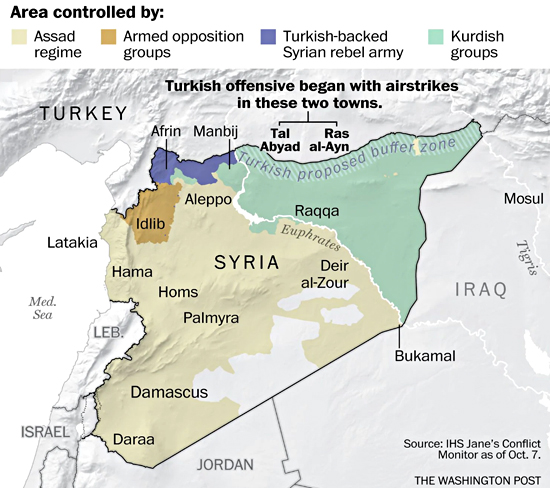
Together with its Russian, Iranian
and Hezbollah allies, Damascus would make short shift of the remaining jihadist
fighters in Idlib province (dark brown area) now
known as Hayat Tahrir
al-Sham, which was formerly called al-Nusra Front and
before that Al Qaeda.
In short, the Donald’s bold decision
to stand down rather than dither in place forever ala the Afghan fiasco has
paved the way for a swift end to the horrific Syrian Civil war. The latter
caused more than 500,000 deaths, generated upwards of 9 million internal and
external refugees, utterly ruined the Syrian economy and civilian
infrastructure and dangerously roiled the entire middle east.
Needless to say, with Syria whole
again and Damascus able to militarily secure its own territory with the help of
the Russian air force and the professional military detachments of the Iranians
and Hezbollah, there won’t be any ISIS caliphate reviving itself anywhere on
the map below.
Nor would there be any reason for
Washington’s war addicts to tie-on another binge of full-throated
fear-mongering about the threat of "radical Islam" and the barbaric
head-choppers of the short-lived, flukish Islamic
State.
Even a cursory examination of the
history, in fact, reminds us that the caliphate was actually enabled, fostered
and armed by Washington’s regime change interventions in Iraq and Syria. Had
the neocons not caused Washington to plunge into the 2011
Syrian uprising with billions of weapons, training and walking around money,
there would have been no armed civil war in Syria; ISIS would not have
implanted itself in Raqqa and in the north and east
of Syria; and Washington would not have had cause to arm the Kurdish
separatists, which had long been a both thorn in Damascus’ side and viewed as
an existential threat by the Turks.
===========
q.
Steve
Bannon – a Profile of a US Apparatchik. From China to
the Pope

http://www.informationclearinghouse.info/52437.htm
===========
r.
Edward
Snowden
http://www.informationclearinghouse.info/52439.htm
Interviewed
by Joe Rogan
===========
s.
From: Diana Johnstone
Sent: Friday, October 25, 2019
Subject: Julian Assange SOS
The plain truth is that Julian Assange is alone, facing all the power of the U.S. determined to crush him, and with no effective defence.
His listless legal defence has done nothing to extract him from his British dungeon, where his health is visibly deteriorating.
His lawyers, such as they are, seem more anxious to score human rights points than to denounce the total illegality of the whole case mounted against him for merely revealing documented truth.
The United States dares accuse of “treason” a citizen of another country, which has dire implications for freedom of expression all over the world.
Please read the document below, and think what you can do. . . .
All the best,
Diana
Liberating Assange: A woeful lack of leadership
http://www.nnn.se/nordic/assange/lead-lack.pdf
For years there has been widespread and growing support for Julian Assange in many parts of the world. This I have learned from a variety of sources, including so-called alternative media, and queries addressed to me in consequence of my own modest efforts to inform (see www.julian-assange.se and www.nnn.se/nordic/assange.htm).Recently, for example, two correspondents in France inquired if I had any opinion of or additional knowledge relating to an article containing brutal criticism of Julian’s lawyers. Both women expressed what one referred to as ”my frustration and sense of powerlessness” concerning Julian’s predicament. Such sentiments are far from uncommon, and may in large measure be explained by the sorrowful fact that Julian’s supporters worldwide — who at this point number in the millions and are clearly prepared to contribute time, energy and money— have been left unorganised and poorly informed.That observation is in no way meant to disparage or trivialise the efforts of individualslike John Pilger, who for years has been conducting an extensive one-man information service, making himself available to all sorts of media for interviews, etc. — while donating large amounts of time and energy that he might devote to more personal matters if there were equally knowledgeable, accessible and responsive additional sources to share the burden. I, for one, have not discovered any. Discouraging initiativeIt was due to my great respect for John Pilger, both for his unflagging support to Julian Assange and for his many journalistic achievements, that I unhesitatingly assented when he earlier this year asked me to help with a project in Sweden.The objective, at least initially, was to gather a respectable number of endorsements for a statement in support of Julian Assange to be published in Swedish media, commissioned and financed by the WikiLeaks organization. The name-gathering began on 22 May and soon everything was arranged for full-page ads to be published in two leading Swedish newspapers on Monday, June 3rd, with a statement endorsed by over 100 citizens in various walks of life.But a few days before scheduled publication, WikiLeaks leaders informed John that it had decided not to go ahead with publication ”at this time”. No discussion. No consultation. No explanation. Only some vague noises about publication at some unspecified later date which became increasingly vague and less specific as the days passed. In the end, under mounting pressure from endorsers to act upon their eagerness to openly declare their support of Julian, the statement was published on a website established for that purpose. (More detailed account at https://julian-assange.se/english/history.htm.)To put it mildly, this episode indicated a state of disarray or worse among the presumptive leaders of Julian’s most crucial and well-informed support in London. It also seemed to express a dismal lack of respect for John Pilger, who through the years has contributed so much. And, of course, it demonstrated an utter disregard for all the Swedes who donated their time, energy and good names to the project.
It would be difficult to devise a more effective method for repelling adherents and discouraging initiative. What’s happening, how to know?The arbitrary cancellation of the Swedish initiative is one of many signs that a coherent, well-organised campaign in support of Julian Assange is notable by its absence. Much the same can be said of the information available to those who may wish to participate in such campaign. For an uninitiate in Saskatchewan, Sweden or Sri Lanka wanting to learn and help, where to turn for enlightenment? One obvious place to start, of course, is with the organisation that Julian is world-famous for having founded. But a visit to the WikiLeaks website does not have much to say about his persecution. There is nothing about it on the home page at www.wikileaks.org. In the ”News” subsection there are a couple of related articles, the most recent dated June 7 of this year. Those who seek further under the ”About” heading will, toward the end of the page, find this reference: ”Julian Assange's ongoing detention without charge is best described here: https://justice4assange.com/3-Years-in-Embassy.html”That’s all there is to learn about the Assange case from the WikiLeaks website. Not so incidentally, the link to the justice4assange website does not appear to be functioning. When I yesterday and today clicked on that link with both Firefox and Chrome, I got either a blank page or this message: ”Error. Bad request or the file you have requested does not exist. Please wait few minutes and try again.” Those who know what to do next may be able to access the Justice for Assange website via its home page at https://justice4assange.com— but often first after receiving and complying with the ”Bad request” error message. If they eventually succeed, they are greeted with this sight:
The video is a 37-second excerpt from a statement on 5 February 2016 by Christophe Peschoux, identified only as ”UN working group secretary”. The group in question is presumably the UNWGAD. Note that the date is Feb. 2016, more than 3½years ago. Among many other things not mentioned is the far more powerful statement by the U.N. Special Rapporteur on Torture from May of this year. Beneath the video are some Frequently Asked Questions which include ”When did Assange enter the embassy, and why is he there?”, indicating that the website has not been updated since before Julian’s arrest in April this year. Otherwise, the site does not appear to be functioning well or at all. Clicking on the section headings in the top menu (Action, Statements, etc.) has no effect, i.e. one remains on the home page. But it does produce some mixed headings in the menu, for example: These and other problems, including the frequent reappearance of the ” Bad request” error message, render this website of little or no use. Yet it is recommended by WikiLeaks as the source where ”Julian Assange's ongoing detention without charge is best described”.Defending WikiLeaks — not Julian AssangeApparently some person(s) decided several years ago that the principal source of information about the Assange case on the Internet should be the website entitled ”Defend WikiLeaks” (not ”Defend Assange”). It may, however, be questioned how widely that is understood or agreed. I routinely explore a broad range of sources via the Internet for information about Julian Assange and many other subjects, but rarely come across any reference to Defend WikiLeaks. WikiLeaks’ own website makes no mention of its Defender, but instead links readers to the error-prone site of Justice for Assange. The Defend WikiLeaks website seems to be equally prone to the ” Bad request” error message. Those who succeed in gaining access see this home page:
The top menu clearly indicates that ”Julian” is a subsidiary issue.There is no photo or other image of Julian on this, the opening page of the section labelled ”Julian” on the Defend WikiLeaks website. The banner headline seems to suggest that the arrest of Julian was a recent event, not something that occurred over half a year ago. The 45-second video was apparently produced by the British Labour Party. After a half-second with the puzzling opening image —apparently taken during the arrest of Julian in April — the video segues to a statement in support of Julian recited by an unidentified but presumably Labour politician, accompanied by excerpts from the infamous ”Collateral Murder” video.WikiLeaks’ own website makes no mention of its Defender, but instead links readers to the error-prone site of Justice for Assange. In relation to Julian’s current predicament, the relevance of the video and the quote beginning ”Congress shall make no law” is not immediately evident. The appeal for money is very clear, however. Visitors — presumably from all over the world and with many different native tongues that are not English — are apparently expected to understand what ”Liveblog” means, and that in this case it involves current news about the Assange case. Those who, for whatever reason, choose to click on the Liveblog link are at risk of being met with the ”Bad request” error message. If and when they do gain access to that page, they will probably find it difficult to navigate — sluggish and erratic, as appears to be the case with navigation within and between most pages of the website. How much life there is in the Liveblog is open to question; the most recent entry is from October 16, three days ago. The lead headline is ” Julian Assange Arrested, Donate to the campaign now”. Beneath that is a small subhead: ”Arrest info and how else to get involved here”. Clicking on that link opens either the ”Bad request” error message or a page headlined ”Emergency: Julian Assange has been arrested”. That again.There is some mention of his imprisonment in ”About Julian Assange” — 142 of the 2519 words on that page touch upon the subject. The ”Prison Updates” page contains two entries with a total of 491 words, the most recent dated 30 September 2019. The section labelled ”Take Action” opens with another appeal to ”Donate”. That is followed by some fairly self-evident suggestions about what one might do to help. It is noted that ”There are numerous local groups and campaigns that have sprouted up in support of Julian Assange around the world”. But no effort has been made to unite them into a coherent force, or even to document them and their activities. Then there is the question of the website’s visual appeal. Design is a matter of taste, of course. But I am fairly confident that if a random sample of Internet uses were asked to compare this website with just about any other —www.wikileaks.orgor www.julian-assange.se, for example — the harsh yellow-blackness of defend.wikileaks.org would not be seen as especially inviting. Clearly inadequateEtc., etc.... In short, the website designated by some obscure process to serve as the primary Internet source of information about the Assange case is clearly inadequate. Among other things, I have never before encountered a website that performs so poorly from a purely technical standpoint — more than slightly perplexing, given the technical expertise of those associated with Julian Assange and WikiLeaks. The failure to provide vital, up-to-date information is even more perplexing, to indulge in understatement.Of course, it can be and has been reasoned that there are many other sources available among alternative and even mainstream media, some of which are referenced on the Defend WikiLeaks website. But how to interpret and choose among them?To take one of countless examples: Some media have recently reported that Julian is in very poor health, others that he is in good health. Which to believe?What is very much needed is an authoritative source, acting on Julian’s behalf, which provides reliable fresh information while resolving the contradictions, confusions and inaccuracies of media and other reports. That would appear to be a precondition for any global campaign to secure his freedom. Needless to say, such a campaign would be very difficult to organise and coordinate. But difficult tasks have been accomplished before — by Julian Assange, for example. It may well be that those who have been leading current efforts, whoever they are, have been doing their very best. If so, their efforts are to be gratefully acknowledged.But in a situation like Julian’s, the need for dedicated and effective leadership does not dissipate just because certain individuals are unable to provide it. The time to identify and recruit such leadership is long overdue, and that will no doubt require some blunt and open discussion.
Initial suggestionsBy way of imitating such a discussion, here are a few suggestions about what needs to be done:• Launch an independent global campaign dedicated solely to the release of Julian Assange from captivity, with an appropriate title such as ”Assange Freedom Now!”•Recruit a qualified steering committee to lead and legitimise the campaign. Names like Mairead Maguire, Craig Murray and Ray McGovern come to mind. So does John Pilger’s, of course; but he has already done so much that it seems impertinent to contemplate asking. • Establish an adequately staffed and funded campaign headquarters, presumably in London but possibly elsewhere, to carry out tasks including:Create and constantly maintain an attractive, easily read and technically efficient website to provide continual and authoritative reports on Julian’s current situation and related matters, correct errors in other media, answer reader enquiries, etc.Develop and maintain a comprehensive list of solidarity groups around the world, document their actions, respond to their requests for information and guidance, etc.Help plan, organise and execute major actions.Anyone who wishes to discuss these and related issues is very welcome to contact me.
Al Burke
Swedeneditor@nnn.se
+46/(0)8 731 9200